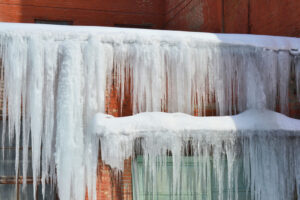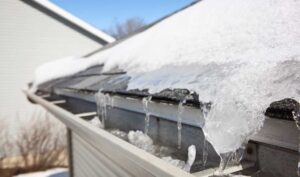Updated April 2025
Winter in Wisconsin is beautiful—with snow-covered rooftops and frozen trees—but it can also be dangerous for homeowners. The biggest hidden threat? Ice dams. These frozen barriers along the edge of your roof may look harmless, but they can cause serious water damage to your Wisconsin home. Let’s break down how ice dams form, why they’re so damaging, and what you can do to prevent ice dams this winter.
Understanding Ice Dams and Their Dangers

What is an Ice Dam?
An ice dam forms when snow on the roof melts, usually because warm air escapes from the attic which melts and freezes water near the edges. As more snow melts, trapped water pools behind the dam and can leak under your shingles. This leads to damage inside—ruined ceilings, walls, insulation, and even mold growth.
How Ice Dams Form in Wisconsin:
Our cold climate and freeze-thaw cycles create ideal conditions. Heat from inside your home warms the upper part of the roof, which helps melt the snow, but when that water reaches the colder eaves, it freezes again. Over time, this process causes ice dam formation.
Wisconsin’s Changing Winter Climate (2023-2025) and Ice Dams

Wisconsin winters are getting warmer overall, but that doesn’t mean less risk. In fact, the 2023–24 season was the warmest on record, and extreme temperature swings—like Milwaukee’s 74°F to 23°F drop in 24 hours—are becoming more common. These sudden changes may increase the chances of ice dams forming. And while total snowfall may be down, intense snowstorms are up—like the April 2024 blizzard that dumped 15+ inches of snow in parts of the state.
Building Codes and Insulation Standards in 2025
New building energy codes make proper insulation and protection more important than ever. In our climate zones (zones 6 and 7), the current recommendation is R-49 to R-60 for attic insulation. In a 2024 IRC update, new rules require an ice barrier membrane that must extend at least 24 inches inside the exterior wall line of the building.
Your Best Defense: Seal, Insulate, Ventilate
The best way to prevent ice dams is with a three-part plan:
Seal Air Leaks
Most heat loss happens when warm air escapes into the attic through small gaps. Seal the gaps around plumbing vents, lighting, ductwork, and chimney chases using foam or caulk to create a continuous air barrier at the ceiling line. A blower door test can help you find hidden air leaks.Upgrade Attic Insulation
More insulation means less heat loss and is an important part of protecting your home every winter. Blown-in fiberglass is a great way to boost your attic insulation to the recommended level of R-49-R-60 (that’s approximately 16-20 inches of insulation Be sure your insulation is spread evenly, paying special attention to the eaves.Ensure Proper Ventilation
A properly ventilated attic stays dry and cool. It works by lowering attic temperatures and removing excess moisture, which helps reduce the risk of roof damage and mold. Follow the 1:150 rule—one square foot of net free vent area for every 150 square feet of attic floor. This can be reduced to 1:300 if a vapor barrier and balanced vents are in place. Placement matters too: balance intake vents at the eaves or soffits with exhaust vents at the ridge or upper roof. Maintain a 2-inch gap between insulation and the roof sheathing, using foam baffles to ensure airflow isn’t blocked. Avoid powered attic ventilation, such as attic fans—they can create negative pressure and pull warm air from your home into the attic. Instead, use passive systems like soffit and ridge vents for a properly ventilated attic that supports long-term ice dam prevention.
Modern Roofing Materials and Ice Dam Mitigation
Today’s materials are built to help you fight back against ice dams:
- An ice and water shield underlayment, a self-adhering waterproof membrane, is now required by our state building code and provides extra protection along roof edges.
- Choose synthetic roofing felts, metal roofing, or high-performance Class A underlayment for more durability.
- Do not install heat cables on trouble spots. They use lots of energy and may damage your roof and shingles.
- For new home builds in areas with heavy snow loads, a cold roof design (a vented space above the insulated roof deck) can help prevent ice dam formation from the start.
Winter Maintenance Tips to Prevent Ice Dams
- Use a roof rake (safely from the ground) to remove snow after storms—focus on the first 3–4 feet from the edge.
- Keep your gutters and downspouts clear so water can drain.
- Check that your roof vents and exhaust outlets aren’t blocked by snow.
- Watch for large icicles—they may signal a problem. Do not try and remove them yourself and avoid using ice-melt chemicals on your roof.
- Never try to chip away ice or use salt. Avoid DIY ice dam removal and hire a pro to safely steam off any existing ice dams.
Stay Proactive and Stay Protected
In Wisconsin, winter isn’t just about staying warm—it’s about keeping your home safe. A tight attic with proper insulation, sealed air leaks, and a properly ventilated roof can make all the difference. Add in durable roofing and smart winter upkeep, and your home can stand strong against even the toughest storms.
Need help? Rockweiler Insulation is here to assist. From sealing your attic to upgrading your home’s insulation, we help you fight ice dams before they form. Don’t wait for water damage to strike—contact us today and get your home winter-ready.
References
Act Now to Prevent Ice Dams and Costly Home Repairs. Clean Energy Resource Teams, www.cleanenergyresourceteams.org/act-now-prevent-ice-dams-and-costly-home-repairs. Accessed 11 Apr. 2025.
Annual 2024 Climate Summary. Wisconsin State Climatology Office, climatology.nelson.wisc.edu/wisconsin-annual-2024-climate-summary. Accessed 11 Apr. 2025.
Attic Air Sealing, Insulating, and Ventilating for Ice Dam Prevention. Building America Solution Center, basc.pnnl.gov/information/attic-air-sealing-insulating-and-ventilating-ice-dam-prevention. Accessed 11 Apr. 2025.
Attic Ventilation 101. IIBEC, iibec.org/attic-ventilation-101. Accessed 11 Apr. 2025.
Dealing with and Preventing Ice Dams. University of Minnesota Extension, extension.umn.edu/protecting-home-rain-and-ice/dealing-and-preventing-ice-dams. Accessed 11 Apr. 2025.
Key Change to Ice Barrier Requirements in the 2024 IRC. The Building Code Forum, www.thebuildingcodeforum.com/forum/threads/key-change-to-ice-barrier-requirements-in-the-2024-irc-what-you-need-to-know.36860/. Accessed 11 Apr. 2025.
Preventing Roof Ice Dams. Weather.gov, www.weather.gov/grr/roofIceDams. Accessed 11 Apr. 2025.
Recommended Home Insulation R-Values. ENERGY STAR, www.energystar.gov/saveathome/seal_insulate/identify-problems-you-want-fix/diy-checks-inspections/insulation-r-values. Accessed 11 Apr. 2025.
Winter’s Unexpected Threat: Ice and Water Damage. FORTIFIED, fortifiedhome.org/article/winters-unexpected-threat-ice-and-water-damage. Accessed 11 Apr. 2025.
Wisconsin’s Warming Winters: Trends and Ripple Effects. WUWM 89.7 FM, www.wuwm.com/environment/2025-02-14/wisconsins-warming-winters-trends-and-ripple-effects. Accessed 11 Apr. 2025.



